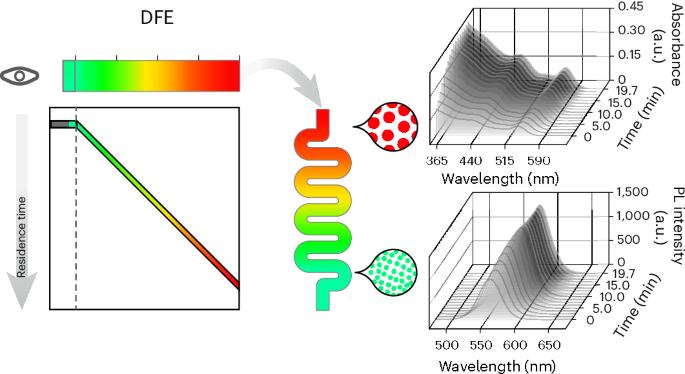Flow-driven data intensification to accelerate autonomous inorganic materials discovery
引用次数: 0
Abstract
The rapid discovery of advanced functional materials is critical for overcoming pressing global challenges in energy and sustainability. Despite recent progress in self-driving laboratories and materials acceleration platforms, their capacity to explore complex parameter spaces is hampered by low data throughput. Here we introduce dynamic flow experiments as a data intensification strategy for inorganic materials syntheses within self-driving fluidic laboratories by the continuous mapping of transient reaction conditions to steady-state equivalents. Applied to CdSe colloidal quantum dots, as a testbed, dynamic flow experiments yield at least an order-of-magnitude improvement in data acquisition efficiency and reducing both time and chemical consumption compared to state-of-the-art self-driving fluidic laboratories. By integrating real-time, in situ characterization with microfluidic principles and autonomous experimentation, a dynamic flow experiment fundamentally redefines data utilization in self-driving fluidic laboratories, accelerating the discovery and optimization of emerging materials and creating a sustainable foundation for future autonomous materials research. This study embeds dynamic flow experiments into self-driving laboratories, intensifying data acquisition during autonomous materials synthesis. Demonstrated with colloidal quantum dots, the developed method substantially boosts sampling density over tenfold and reduces time and reagents.

流驱动的数据强化,加速自主无机材料的发现
先进功能材料的快速发现对于克服能源和可持续性方面紧迫的全球挑战至关重要。尽管最近在自动驾驶实验室和材料加速平台方面取得了进展,但它们探索复杂参数空间的能力受到低数据吞吐量的阻碍。本文介绍了动态流动实验作为一种数据强化策略,通过将瞬态反应条件连续映射到稳态当量,在自驾车流体实验室中合成无机材料。应用于CdSe胶体量子点作为测试平台,与最先进的自动驾驶流体实验室相比,动态流动实验在数据采集效率和减少时间和化学消耗方面至少提高了一个数量级。通过将实时、原位表征与微流体原理和自主实验相结合,动态流动实验从根本上重新定义了自动流体实验室的数据利用,加速了新兴材料的发现和优化,为未来的自主材料研究奠定了可持续的基础。本研究将动态流动实验嵌入到自动驾驶实验室中,加强了自动材料合成过程中的数据采集。胶体量子点证明,开发的方法大大提高了十倍以上的采样密度,减少了时间和试剂。
本文章由计算机程序翻译,如有差异,请以英文原文为准。
求助全文
约1分钟内获得全文
求助全文

 求助内容:
求助内容: 应助结果提醒方式:
应助结果提醒方式:


